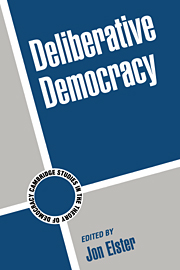Book contents
- Frontmatter
- Contents
- List of Contributors
- Preface and Acknowledgment
- Introduction
- 1 “Claro!”: An Essay on Discursive Machismo
- 2 Deliberation as Discussion
- 3 All Men Are Liars: Is Democracy Meaningless?
- 4 Deliberation and Constitution Making
- 5 Pathologies of Deliberation
- 6 Deliberation and Ideological Domination
- 7 Arguing for Deliberation: Some Skeptical Considerations
- 8 Democracy and Liberty
- 9 Health-Health Trade-offs
- 10 Full Representation, Deliberation, and Impartiality
- Index
8 - Democracy and Liberty
Published online by Cambridge University Press: 05 June 2012
- Frontmatter
- Contents
- List of Contributors
- Preface and Acknowledgment
- Introduction
- 1 “Claro!”: An Essay on Discursive Machismo
- 2 Deliberation as Discussion
- 3 All Men Are Liars: Is Democracy Meaningless?
- 4 Deliberation and Constitution Making
- 5 Pathologies of Deliberation
- 6 Deliberation and Ideological Domination
- 7 Arguing for Deliberation: Some Skeptical Considerations
- 8 Democracy and Liberty
- 9 Health-Health Trade-offs
- 10 Full Representation, Deliberation, and Impartiality
- Index
Summary
Main Ideas
The fundamental idea of democratic, political legitimacy is that the authorization to exercise state power must arise from the collective decisions of the equal members of a society who are governed by that power. That is a very abstract statement of the concept of democracy – as abstract as it should be. Democracy comes in many forms, and more determinate conceptions of it depend on an account of membership in the people and, correspondingly, what it takes for a decision to be collective – authorized by citizens as a body.
Consider two conceptions of democracy, distinguished by their interpretations of the fundamental idea of collective decision: I will call them aggregative and deliberative. Both views apply in the first instance to institutions of binding collective decision making, and each interprets the fundamental ideal that such institutions are to treat people bound by collective decisions as equals. According to an aggregative conception of democracy, then, decisions are collective just in case they arise from arrangements of binding collective choice that give equal consideration to – more generically, are positively responsive to – the interests of each person bound by the decisions. According to a deliberative conception, a decision is collective just in case it emerges from arrangements of binding collective choice that establish conditions of free public reasoning among equals who are governed by the decisions.
- Type
- Chapter
- Information
- Deliberative Democracy , pp. 185 - 231Publisher: Cambridge University PressPrint publication year: 1998
- 89
- Cited by

